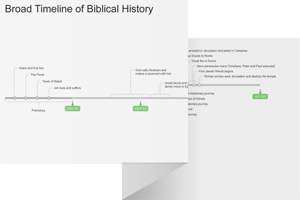1:1–20 The narrative of 1 Samuel The opening section tells the birth story of Samuel, |
1:1 Ramathaim Zophim Shortened to Ramah in 1 Sam 1:19. Several areas named Ramah existed during this time; the narrative later indicates that Samuel lived in Ramah (7:17; 25:1).
an Ephraimite Likely describes Elkanah’s geographic designation. Genealogically, he was a Levite (1 Chr 6:33–34). Joshua 24:33 describes Levites as living in the hill country of Ephraim.
1:2 He had two wives Polygamy recalls the patriarchs of Genesis, particularly Abraham and Jacob (see Gen 16:3; 29:21–28; 30:4, 9). It is possible that Hannah was Elkanah’s first wife, and he married Peninnah because Hannah did not bear children.
Hannah had no children The narrative portrays Hannah in the same manner as the matriarchs of Genesis—Sarah, Rebekah, and Rachel (Gen 21:1–5; 25:21; 29:31–30:2). The text indicates that her conception of a child will be an act of God, and that her child will do great things for God
in the same manner as the matriarchs of Genesis—Sarah, Rebekah, and Rachel (Gen 21:1–5; 25:21; 29:31–30:2). The text indicates that her conception of a child will be an act of God, and that her child will do great things for God and His people.
and His people.
1:3 year by year Demonstrates his piety (see Deut 12:5–7).
Shiloh Where the tabernacle was. See Josh 18:1.
1:4 he would give portions to his wife Peninnah Elkanah gave Peninnah food portions based on the number of children she had.
1:5 double portion These annual pilgrimages and their accompanying feasts would have been a source of great shame for Hannah. Peninnah would receive larger portions of food because she had given birth to many children. Elkanah probably didn’t intend to cause her shame; however, this single or select portion would have perpetually reminded Hannah of her barrenness.
1:6 her rival wife Refers to Peninnah.
1:7 would not eat Hannah was ashamed; see 1 Sam 1:5 and note.
1:8 I not better to you In the ancient Near East, husbands were essential for a woman’s survival, but children brought them honor. Without children, Hannah would have felt only shame.
ten sons This could be hyperbole to connote an abundant blessing from God. This number also recalls the 10 sons that Jacob’s other wives bore to him while Rachel was barren (see Gen 29:31–30:21).
1:9 Hannah got up Hannah is portrayed as the paragon of faith among the women of the Hebrew Bible. No other woman in the ot goes to the house of Yahweh (except Peninnah, by inference).
1:11 She made a vow The only woman recorded in the ot as having made and kept a vow to God.
O Yahweh of hosts Hannah calls God by the Hebrew title yhwh tseva'oth, which identifies Him as a commander of armies—those of Israel, as well as heavenly armies.
a razor will never pass over his head Indicates that Hannah will set her son aside to become a Nazirite (see Num 6:5). According to the law, Elkanah could have voided Hannah’s vow (see Num 30:6–15). It is a testimony to his piety that he does not.
(see Num 6:5). According to the law, Elkanah could have voided Hannah’s vow (see Num 30:6–15). It is a testimony to his piety that he does not.
1:13 Eli considered her to be drunk She was praying intensely and inaudibly.
1:14 Put away your wine Eli orders her to stop drinking.
1:15 I have poured out my soul before Yahweh In contrast to some of the matriarchs in Genesis, Hannah took her problems directly to God in prayer (compare Gen 16:1–3; 30:1–21).
1:16 Do not regard your female servant as worthless The Hebrew term used here, bath beliyya’al, refers to a woman guilty of heinous and indiscreet acts against the law. People referred to by the term beliyya’al are often characterized as wicked, worthless, and treacherous.
1:19 at Ramah A shorter name for Ramathaim-zophim (see note on v. 1).
had sexual relations with The ot commonly uses this Hebrew verb, meaning “to know,” as a euphemism for sexual intercourse. Some English translations exchange this ancient euphemism for a more contemporary one; others avoid the euphemism altogether.
Yahweh remembered her Indicates that Yahweh now turns His attention to her; He had not forgotten her (see Gen 8:1; 30:22; Exod 2:24). Through Hannah, God initiates a new phase in His plan for Israel (compare Gen 8:1; Exod 2:24).
1:20 Samuel Means “his name is God” or “name of God”—an emphasis on God’s role in Samuel’s life. Hannah’s explanation of the name is a wordplay based on a similar-sounding Hebrew phrase meaning “heard from God.”
The son of Elkanah and Hannah, Samuel served as a priest, prophet, and judge in 1 Samuel. He was God’s instrument in Israel’s transition from the period of the judges to the monarchy, and he functioned as God’s kingmaker. Samuel anointed both Saul |
1:21–28 Keeping her vow, Hannah dedicates Samuel to God. After he is weaned, she presents him to Eli, the priest at Shiloh, to serve in the house of God. |
1:24 three bulls A lavish gift according to the standards of the Pentateuch.

|
About Faithlife Study BibleFaithlife Study Bible (FSB) is your guide to the ancient world of the Old and New Testaments, with study notes and articles that draw from a wide range of academic research. FSB helps you learn how to think about interpretation methods and issues so that you can gain a deeper understanding of the text. |
| Copyright |
Copyright 2012 Logos Bible Software. |
| Support Info | fsb |
 Loading…
Loading…




 Samuel
Samuel